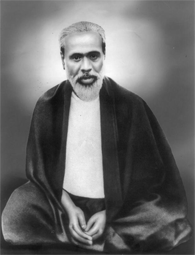
- Home
- Our Master
- Story of Pujya Lalaji Maharaj
Story of Pujya Lalaji Maharaj

Great men are not accidentally born, they are born when the world waits for them in eager expectation" said Swami Vivekananda. After the influence of the East India Company got entrenched in India, leading to the enslavement to the British empire which ruthlessly followed the principle of expansionism to the total detriment of the local culture and traditions. This resulted in abject submission in to the economic, political and finally spiritual systems of the white race and their belief and faiths. This period is generally agreed to be the low ebb of Indian ethos. Thus the medieval and modern periods in the contemporary history of India are regarded as dark periods which produced only intellectual giants who could speak with double tongue always to their advantage and that of the rulers of the day. No spiritual spring was there from which the yearning masses could draw their succor. Sanatana Dharma which is Spirituality per se beyond all religions, was almost lost even in the land of its origin. Many great men were however satisfied with social and cultural reforms, armed mutiny or in the religious rejuvenation of society. However saints of the calibre of Swami Vivekanandaji who are pioneers in the field of spirituality and the guiding personalities in the field even today were convinced that a day would come when mighty minds would arise and India would show light to the world.
Great men are not accidentally born, they are born when the world waits for them in eager expectation and thus the power of Nature descended in human form as Samarth guru Mahatma Ramchandraji Maharaj. It happened as Divinity would will, on the Basant Panchami day in the month of Magha in the year 4974 after the beginning of Kali yuga corresponding to the 2nd Feb. 1873 A.D. at Fategarh in the state of UP in India. His father Sri Harbux Rai belonged to a very distinguished family of kayasths. His great grand father was a person of rare genius and his fine qualities and noble attainments won for him, from the Great Moghul emperor unstinted praise and friendship. He was given the title of Chowdhari and a jagir comprising 555 villages. He resided in the town of Bhoomigram in the district of Mainpuri in UP India. The family which got affected by the after effects of the uprising of the Indians in 1857 (called sepoy mutiny by the biased British historians) migrated to Fategarh, U.P. Here he worked as tax superintendent and began to live with his family. But in the changed circumstances his state had been subjected to considerable damage and his assets were just enough to live the old aristocratic life.
His wife was a saintly lady. Her heart was full of devotion and she was strongly attracted towards God. She had great regard for saints and served them whenever she had an opportunity. She had a melodious voice and her recitation of Ram Charit Manas thrilled the audience. Charity the principle of a Grhasta was practiced by her to the fullest and no needy person ever left her house without satisfaction. However she had no children. Therefore they had adopted a son.
Once a saint came to Farrukhabad and she went to his satsang along with the her husbands' younger brother. The melodious singing of sakhis of Saint Kabir by the saint touched her tender and devotional heart so much that tears welled up and she got into a state of absorption. This was observed by the saint who silently blessed her. Since then the love for God increased in her and she soared into samadhi condition often. One day an Avadhoot called at her door. He sat down and asked for food which was served to him. After partaking of it he asked for a dish of fish. As she was a Vaishnav she found herself unable to provide the same and asked her maid to make some arrangements. The maid brought the fishes from the outer kitchen of the house and the same was served to the Avadhoot. After getting satisfied with his wish, while leaving the house he asked " what ails you?" Though she did not reply the servant maid said the lady has no children. After a few moments beaming with brightness, raising his fingers towards heaven said "One... two..." and so he left. Soon after the first son Sri Ramchandra was born on 2nd Feb. 1873 A.D. and another son was born on 17th Oct.1875 who was named Sri Raghubar Dayal.
Sri Ramchandra affectionately called Lalaji Saheb from his childhood used to recite Ram Charit Manas for his mother in uncommonly sweet and melodious voice inherited by him from her. While a child, he inculcated in himself a deep love for music and had an amazing aptitude for producing an exact imitation of the intonation etc., of any song which he had heard only once. His mothers' spiritual life had a great effect on him and he had at that age developing a strong love for Reality.
His mother breathed her last when he was only seven years of age and he was brought up by another woman who loved him very dearly. Lalaji had deep regard for her all her life. Once she wanted to give him all her property to him but he firmly refused to accept it and on his own part gave her presents and help throughout her life.
He was educated in Urdu, Persian, and Arabic by private tutor and learnt Hindi from his mother. Later he studied at the Mission School at Farukhabad and passed the English Middle Examination. While at school he lived in a very small room. During those days he was assisted by a muslim teacher in his studies and was influenced by him. One day while playing the game of tops with other boys, the whirling motion of the top reminded him of the work for which was born and since then he took up his spiritual preparation and work. It is the will of God that he attained perfection within a brief span of seven months. While only a student his entire system was transformed into a celestial inner light and his consciousness ascended and transcended all the known stages and reaches to reach the state of statelessness.
He was married to a noble lady of a respectable family. His father expired soon after his marriage. At this period Raja of Mainpuri had brought action against his ancestral property and he lost all the property. His brother, who was adopted by his father also expired around this time. Circumstances forced him to move into a much smaller house and lose all the comforts which he had till then.
At that time one of the associates of his father who was then Collector, Farrukhabad learnt of these tragic incidents and invited him to join as Paid apprentice in his office at rupees ten per month.







